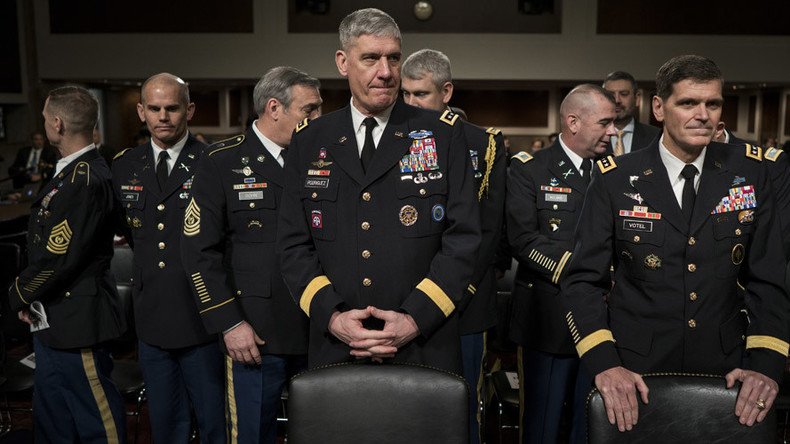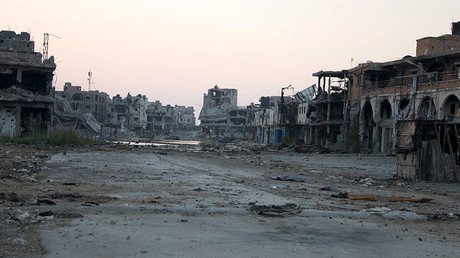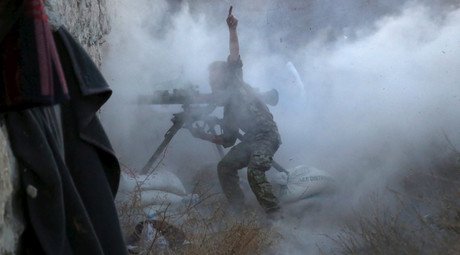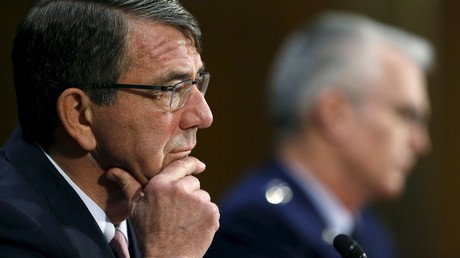US generals to lawmakers: Libya a failed state, Iran a long-term threat

Three top US military commanders told the Senate that the struggle against terrorists in the Middle East and Africa is going well, while explaining their strategic priorities. However, the sea of Pentagon jargon contained some interesting insights.
Facing the Senate Armed Services Committee on Tuesday were chiefs of the US Central Command (CENTCOM) General Lloyd Austin, Africa Command (AFRICOM) General David Rodriguez, and the Special Operations Command (SOCOM), General Joseph Votel.
Rodriguez is expected to retire later this year, while Votel has been tapped by President Barack Obama to succeed Austin as the next head of CENTCOM.
Both their prepared remarks and the question-and-answer session that followed were thick with stock phrases and difficult-to-parse Pentagonese. Often the questions posed by the Senators were more interesting than the answers, suggesting a greater obsession with Iran than Islamic State (IS, formerly ISIS/ISIL).
Iran bad, Saudi Arabia good
One of the root causes behind the instability in the Middle East is the “ethno-sectarian competition that exists between groups and chiefly among Shia and Sunni and Arab and Persian populations,” General Austin told the lawmakers.
Sectarian tensions have seriously weakened several nation-states in the region, and IS has sought to exploit them, CENTCOM’s chief said. In response to a question from Senator Joe Manchin (D-West Virginia), however, Austin said that Iran is the greatest threat to “mid- to long-term stability in the region.”
“Iran maintains hegemonic ambitions and will continue to pose a threat to the region,” Austin argued. “Our relationship with Iran remains a challenging one. We will continue to pay close attention to their actions, while supporting our regional partners and helping them to improve their capacity to counter Iran and mitigate the effects of Iran’s malign activity in the region.”
"The greatest mid to long-term threat to stability in the region is clearly #Iran" Gen Austin adds
— Jeff Seldin (@jseldin) March 8, 2016
This hostility toward Iran was apparent in Austin’s prepared (PDF) testimony on the Gulf Arab states. For example, protests by the disenfranchised Shia Arab majority in Bahrain – where the US maintains a major fleet base – were described as Bahrain facing “a persistent threat from Iran via malign proxy activity within its borders.”
Likewise, Austin described Saudi Arabia’s bloody invasion of Yemen as an effort to “counter the Houthis and associated forces with the goal to return the legitimate displaced Hadi government to power.”
“[Saudi Arabia] desires a stable Yemen with a pro-Saudi government that effectively protects its border, prevents an Iranian proxy from gaining undue influence over strategic terrain that includes the Bab al Mandeb, and protects against safe havens for Al Qaeda in the Arabian Peninsula (AQAP) and other [terrorist groups],” Austin told the lawmakers.
“We are working with the Saudi-led coalition to help mitigate civilian casualties and to ensure that humanitarian assistance flows into Yemen,” he added, while blaming the civilian casualties inflicted by Saudi airstrikes on the Houthis, who he claimed were “positioning armaments or military equipment in areas where civilians are known to be present.”
GEN Votel: At any given day nearly 10,000 SOF are deployed to over 80 countries around the world - at #SASC hearing
— CSIS ISP (@csis_isp) March 8, 2016
Libya a “failed state”
Addressing a question posed by Senator Mazie Hirono (D-Hawaii) about the situation in Libya, General Rodriguez said that the internationally brokered arrangement to create a Government of National Accord faced challenges from “lack of institutions… fractured society, and multiple competing militias.”
“Even with the support of the international community, the GNA will likely struggle for the foreseeable future to establish its authority and secure Libya’s territory, borders, resources, and people,” AFRICOM’s chief said in his prepared remarks.
Rodriguez could not say what percentage of Libya was under IS control, but suggested it was mainly the area around Sirte. When asked by Senator Lindsay Graham (R-South Carolina) if Libya is “at this point, a failed state,” AFRICOM’s chief could only answer “Yes, sir.”
The US is currently engaged in planning and intelligence-sharing with European allies for the Libyan International Assistance Mission (LIAM), an international effort to prop up the national unity government. However, Italy has told the Libyans it would only intervene if the GNA made a formal request for international assistance to the UN, the AP reported on Tuesday.
In Syria, more of the same
With lawmakers more concerned about Russian and Iranian involvement in Syria, it was hard to get a clear picture of the US’ strategy to fight Islamic State, which holds the eastern parts of the country.
On several occasions, General Austin spoke of “indigenous forces” on the ground that could take the fight to IS with US support. In his opening remarks, he requested funds to restart a program to train and equip these forces, calling it “critical to future success.”
That program was shut down last year after producing fewer than 200 fighters, who promptly surrendered to Al-Qaeda-affiliated militants, while handing over their US-provided equipment. One US official called it a “complete disaster.”
Rhode Island Democrat Jack Reed asked if CENTCOM really wanted to revive the failed train-and-equip program.
“We are, Senator,” Austin replied. “I asked permission to restart the effort, using a different approach.”
Senator Mike Rounds (R-South Dakota) was skeptical about General Austin’s claim that “indigenous forces” could successful take back Raqqa, the Syrian city that IS has adopted as its capital.
Later in the hearing, Senator Graham asked General Votel what percentage of the Syrian Democratic Forces (SDF) were Kurds. Votel admitted that Syrian Kurds make up “about 80 percent” of the SDF – the group that General Austin had previously referred to in his comments about “indigenous forces.”
Graham then wondered if there were any plans to take and hold the IS capital.
“There is currently not a plan” to take Raqqa, Votel admitted. “There is not a plan to hold Raqqa.”
US SOCOM Commander Gen Votel "There is not a plan [to take Raqqa]. There is not a plan to hold Raqqa." #sasc
— Gabe Sehr (@GabeSehr) March 8, 2016

















